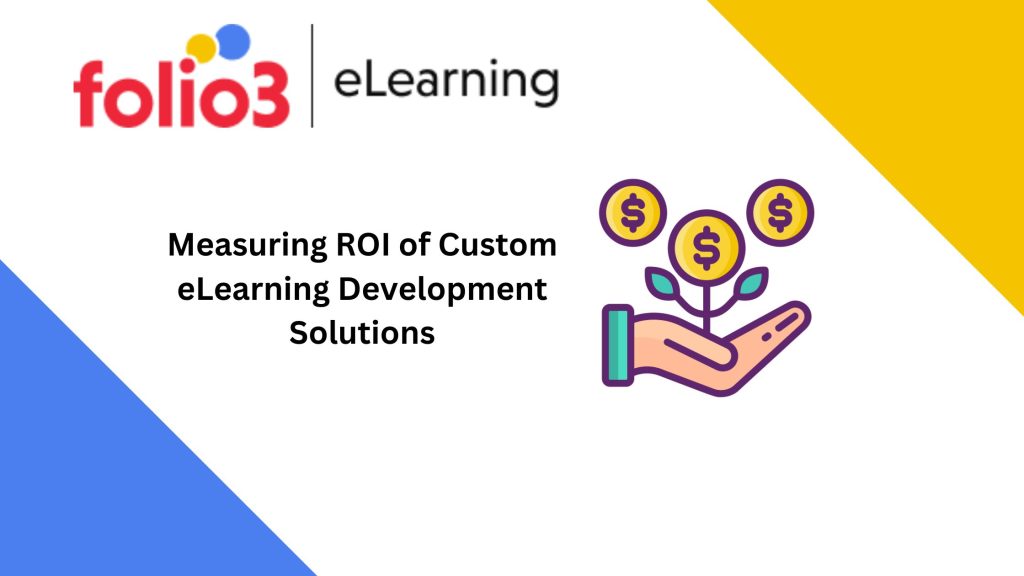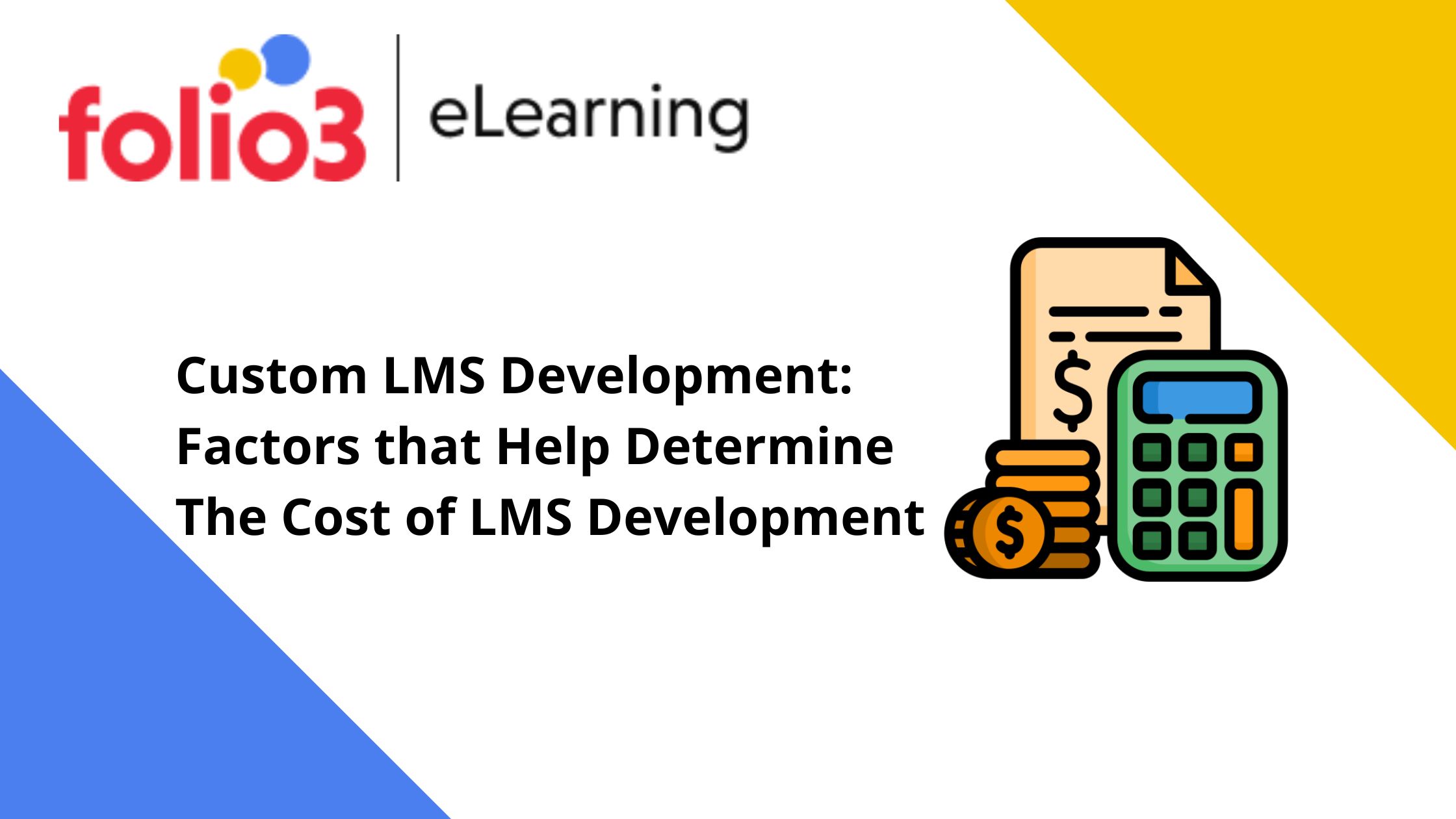
Executive Summary:
Evaluating the return on investment of custom eLearning development solutions is crucial for businesses looking to maximise their training initiatives. Understanding Measuring ROI of Custom eLearning Development Solutions is essential to making wise decisions.
Introduction:
Employee training and development have been central to today’s quickly changing business landscape. Custom eLearning development solutions have become a strategic option for businesses that want to provide individualized and successful learning experiences.
But investing in these solutions necessitates having a clear grasp of their ROI to justify spending, allocate funds properly, and continuously improve training activities.

Understanding the ROI of Custom eLearning Development Solutions
Below are some custom eLearning Development Solutions characteristics and how they affect ROI.
- Improved Learning Efficiency:
Custom eLearning development solutions are essential for increasing the return on investment (ROI) of learning projects within organizations. These solutions significantly impact the effectiveness of learning since they customize training materials to match the demands of the workforce.
Organizations that see increased engagement and better information retention among learners may clearly see the Measuring ROI of Custom eLearning Development Solutions. Metrics like improved test scores and newly acquired abilities serve as tangible indicators of ROI, reiterating the benefit of spending money on customized eLearning sessions.
- Increased Staff Productivity:
The ROI of custom eLearning development solutions goes beyond learning results to affect staff productivity directly. Custom eLearning solutions improve the performance of the workforce with targeted programs that address certain skill gaps.
Quantifying the time saved due to increased productivity or the discernible rise in task completion rates offers a clear view of the influence on the organization’s bottom line. The ROI of custom eLearning development solutions translates into quantifiable productivity benefits as staff members gain proficiency and skill.
- Cost Reductions:
Although custom eLearning development solutions may require a sizable initial investment, significant long-term cost savings highlight the ROI. Traditional training techniques can involve high costs for travel, lodging, and the creation of printed materials.
Organizations can gauge the ROI of custom eLearning development solutions by tracking the gradual decline in these costs. Additionally, the initial investment in eLearning solutions pays off because they can accommodate an increasing number of learners without incurring proportionate increases in costs due to their scalability.
- Adaptability and Flexibility:
In the always-changing business environment, the adaptability and flexibility of custom eLearning development solutions are key factors in their return on investment. Training programs must remain dynamic to adapt to shifting industry trends and corporate rules.
To quickly update content and ensure staff members have the most recent knowledge and abilities, custom eLearning solutions are an affordable option.
- Attracting and Retaining Talent:
The ROI of custom eLearning development solutions extends its influence to the crucial area of talent management. An expertly designed, personalized eLearning experience encourages greater employee happiness and supports their professional development.
This resonance directly influences talent acquisition and retention, two elements that significantly impact an organization’s return on investment.
Increasing ROI with Custom eLearning Development Solutions
There are many ways to increase ROI with custom eLearning development solutions.
A few of those ways are as follows:
- Establish Well-Defined Objectives:
A crucial step in maximizing the ROI of custom eLearning development solutions is to define clear objectives. Organizations develop a roadmap for evaluating the impact of customization by identifying clear objectives, such as enhancing certain abilities or shortening the length of training.
These goals act as standards by which the efficiency of the eLearning solution may be evaluated.
- Collecting Data:
It is critical to use powerful learning analytics to maximize the return on investment for custom eLearning development solutions. Organizations obtain essential knowledge about the efficiency of their tailored training programs through data collection on student progress, engagement levels, and knowledge retention.
This data is the basis for precise ROI estimates and the ability to make well-informed decisions.
- Comparing Custom eLearning Development Solutions to Traditional Approaches:
A strategic method for demonstrating the ROI of custom eLearning development solutions is a thorough cost-benefit analysis. Organizations highlight the benefits of customization by comparing the costs and results of personalized eLearning to conventional training techniques.
These evaluations might show lower costs for travel, venue reservations, and printed materials.
- Continuous Improvement:
The iterative process of maximizing the ROI of custom eLearning development solutions thrives on constant improvement. It is possible to maintain investment alignment with changing organizational needs by regularly evaluating the usefulness and efficacy of customized eLearning content.
The ROI is subsequently increased over time thanks to the proactive approach’s ability to maintain high levels of engagement and knowledge transfer.
- Evaluation and Assessment:
Integrating learner feedback and performance data can significantly increase the return on investment of custom eLearning development solutions. Organizations can continuously improve their unique eLearning solutions by incorporating user insights.
Organizations may improve the learning process by acting on user ideas and observable patterns, which raises engagement and improves learning results.
Conclusion:
Analyzing the ROI of custom eLearning development solutions requires strategic consideration in addition to financial analysis.
Organizations may make wise decisions regarding their training investments by comprehending personalisation’s concrete advantages to employee learning, growth, and overall business performance.
The value of customized solutions is further supported by the ability to gauge the effectiveness of unique eLearning experiences in today’s competitive business climate.











